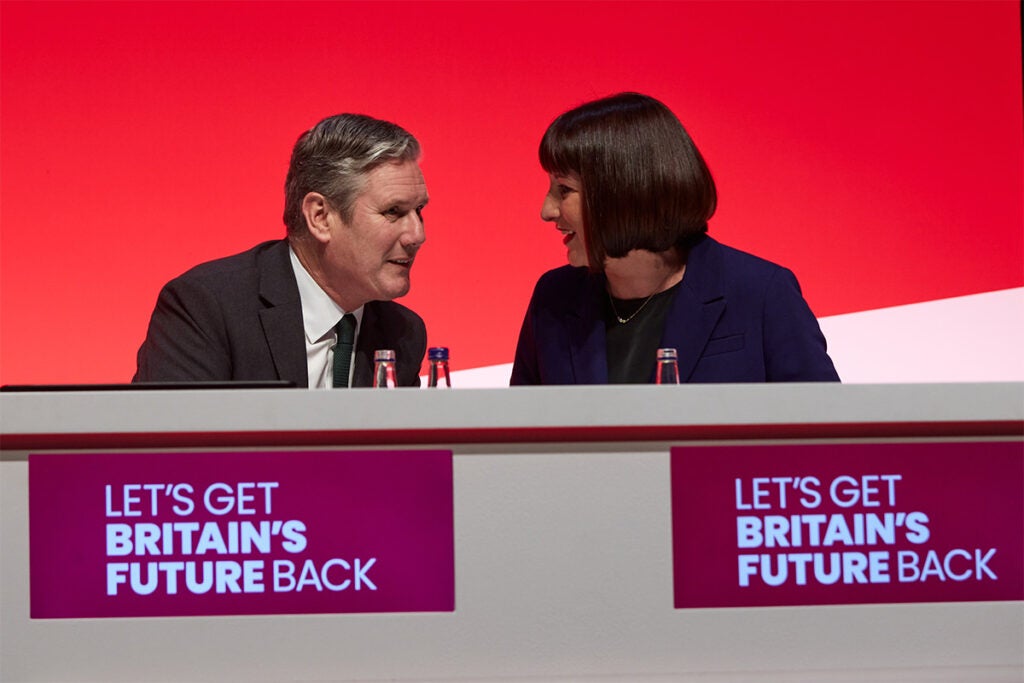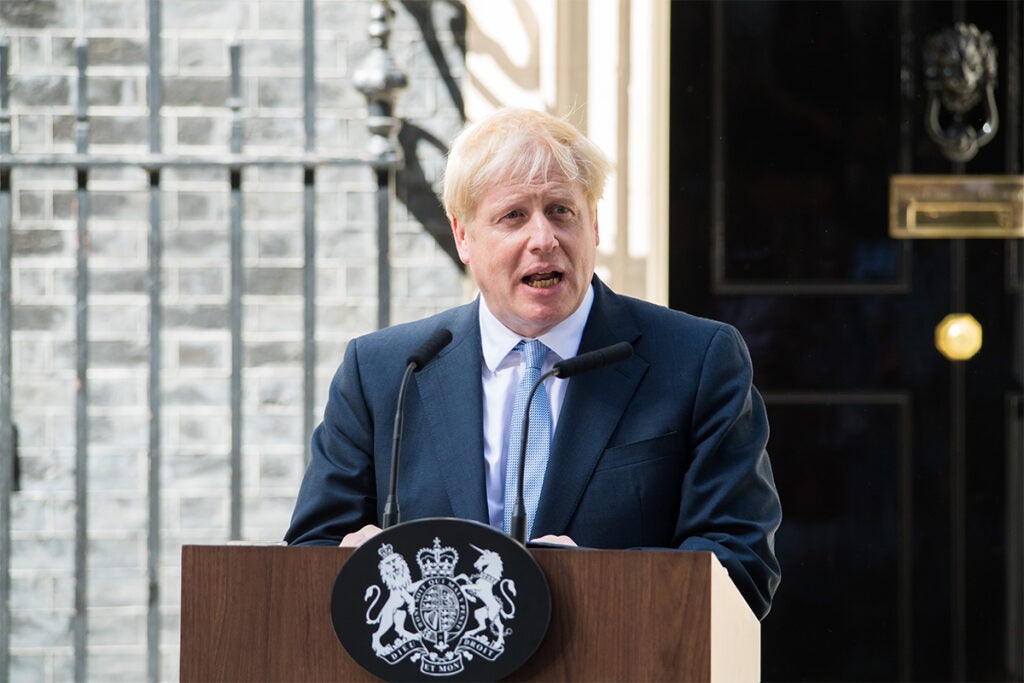
Political donors have long held influence in UK politics, although the role of private wealth has steadily been increasing over the past few years.
Funds from private individuals, up until now, have mainly headed the way of the Conservatives. While the Tories courted the support of more than 70 ‘super-donors’ in 2019 – defined as individuals who give upwards of £100,000 – Labour only had one. (Ninety-three per cent of Labour donations came from trade unions).
[See also: UHNWs brace for tax reform in election year]
But things are changing. UHNWs and prominent businesspeople are switching allegiances to Labour ahead of the next general election, which Rishi Sunak has indicated will be held in the ‘second half of the year’.
The rise of the Labour super-donor

Dr Ewan Kirk, a Cambridge-based science and tech investor who founded the hedge fund Cantab Capital Partners in 2006, reveals for the first time that he is backing Starmer in 2023 after supporting the Liberal Democrats in 2019 and David Cameron in the election prior.
Gareth Quarry, a business tycoon who donated tens of thousands to the Conservatives under David Cameron, has pledged £100,000 to Starmer and is now a card-carrying member of the Labour party. His wife, Jill Whitehouse, has matched the amount. The couple made their fortune after selling a legal recruitment business for £45 million.
[See also: High-tax, high-spend, big-state Britain is here to stay, whoever is in power]
They are not alone. HNWs, businesspeople and entrepreneurs flocked to the Labour Party conference in October, which Quarry says he attended, where Sir Keir Starmer said the business community would be ‘coming into government with us’. Wider conference events were sponsored by Goldman Sachs, Airbus and Amazon. (A drastic U-turn from 2019 when former Labour leader Jeremy Corbyn wished Amazon ‘many happy tax returns’ in honour of its 25th anniversary).
Other HNW Labour super-donors who’ve already declared their allegiance include Gary Lubner, the former Autoglass boss who will reportedly top up his £2.2 million donation from May 2022 with an additional £5 million before the next election. Stuart Roden, former chair of Lansdown Partners, gave at least £180,000 in 2023, while hedge fund boss Martin Taylor donated £100,000 in July to Labour think-tank Labour Together. Serial Labour donor Dale Vince has also said he’ll open his cheque book as the election approaches.
This super-donor support is important if Labour wants to keep up with the Conservatives. According to a recent analysis from the University of Warwick’s CAGE Research Centre, a ‘structural shift’ in UK politics has seen a ‘permanent heightened role for private super-donors’ in recent years. As a proportion of all donations, the overall share of ‘super-donors’ rose from 31 per cent to 45 per cent between 2017 and 2019.
[See also: Billionaires must pay global minimum tax rate]
The general election is also awash with more money overall. Statutory changes made by the government in November are set to increase the amount parties can spend nationally on election campaigning, to around £35 million each. Previously, the spending cap would have been around £19.5 million, if parties field candidates in every constituency in the UK.
Sensible Starmer and Reasonable Reeves

Quarry, who had personal meetings with Cameron during his Tory-supporting years, says Labour under Starmer embodies ‘an honesty and integrity that does not exist [now] within the Tory party’. He is impressed with Sir Keir’s ‘very big brain’ and background as director of public prosecutions, and describes senior Labour figures whom he has met as ‘sensible, thoughtful people’. ‘[The reformulated party is] left of centre — but not crazily so,’ he says. ‘I am seeing financial prudence.’
[See also: Spear’s Tax Survey 2023: what a Labour government could mean for the UK’s tax landscape]
Shadow chancellor Rachel Reeves, a former Bank of England economist, has been key to providing that level of assurance. ‘What you hear from Rachel is what you’re going to get,’ Quarry enthuses. A self-described ‘great believer in private wealth’, he believes that Reeves, who has ruled out a series of taxes on wealth, mansions, and rises in CGT, can support the politics of aspiration. ‘I don’t think Rachel Reeves has any problem with someone like me coming from lower middle class Bedford to what I am now,’ he adds from the living room of his Richmond manor house.
Worth £225 million, Kirk gave £300,000 to the Liberal Democrats in 2019 — having previously been ‘pretty happy’ with Tony Blair’s politics, and ‘reasonably happy’ with David Cameron’s. Now he is considering donating to Labour.
‘In 2019, I personally had the choice of a bloviating narcissist spouting on about levelling-up, without any real plans… and an ageing out-of-touch Marxist. None of those really worked. And the Liberal Democrats were the only sane party,’ he explains. ‘Keir Starmer has done an astonishing job from what he inherited in 2020. The conversations I have had with people in Labour have not been about, “we believe this is the right way to do things. And we will do this because it matches our dogma”. It is, “tell us how we might fix this.” And that’s a really good start.’
What motivates a super-donor toward Labour or Conservatives?

‘You can sort of characterise money in UK politics as a gentlemen’s game, where the gentlemen include the leaders of trade unions,’ says Mirko Draca, who runs the CAGE Research Centre and has studied two decades of political donations given in the UK. ‘Fundamentally, it’s a club’.
He suggests Tory and Labour ‘super-donors’ are driven by a number of motivations. The first are ‘affective’ givers — individuals driven by principles or ideology — who are ‘trying to influence the political process, according to [their] beliefs’. This may have characterised the giving approach of donors around Brexit, Draca explains.
[See also: Why Labour won’t commit to radical wealth tax plan]
But donors may also be driven by ‘instrumental motives’, where ‘you’re seeking something from the political policy process — to influence a decision in some way that furthers your kind of special interest.’ A motivation of this ilk may help to explain the sheer number of one-off donors who give once and then never again.
‘It’s like they’re experimenting… with making some kind of political contact. Think of it as a portfolio investment. You’re investing in political connections, you’re investing in the influence process, and they never donate again,’ Draca says. ‘These are unsuccessful experiments in that process. And I think there’s more [research] to be done on this. What I suspect is happening: people do this, they go to a fundraiser or something, they meet these politicians, and it’s pretty boring.’
With other donors, though, there may be a small ‘consumption motive’ — if they ‘like to go to the parties and the functions’ and be ‘hangers on’, he adds.
PR risk of headline-making donations
While it may be tempting for UHNWs to engage in the political process — to try to use their wealth to affect some change they see as valuable — it can come with risks. Communications supremo Phil Hall, a former News of the World editor who now helps HNWs, entrepreneurs and businesspeople to manage their images, says ‘donors have to be very, very careful about what they’re doing’.
‘People do stop and wonder why someone is giving to a political party. What’s the kickback, what are they doing it for?’ He also cautions that company chairs should be careful about ‘imposing their political beliefs on their customers’, as it ‘puts people off’. ‘The political parties have to declare where their money comes from — you just have to be so wary,’ he adds.
[See also: The 2023 Spear’s Reputation Index]
As donors, Quarry and Kirk are both eager to keep a healthy distance from the political process. While Kirk is a leader in STEM, and sits on the board of BAE Systems, he says he is keen to avoid a relationship where ‘things become transactional’, as it could do if he began to offer advice attached alongside his funds. In those cases, you can ‘sail very close to corruption,’ he says. ‘I think you have to actively avoid saying, “Well, if I give you this money”, I want you to spend it in this way.’
‘You have to be sure there is no expectation, reciprocity, or whatever,’ Quarry affirms. ‘Then again, I put it to you that the Tory party has not been very good at that. The House of Lords is littered with people that gave a lot of money, or did a lot of fundraising.’
The Brexit breaking point

For Quarry and Kirk, the shift to Labour is rooted in the same turning point. Both supported David Cameron politically, yet felt a strong dissatisfaction over the way Brexit was handled.
‘I gave a lot of money to the Remain campaign,’ Kirk says. ‘I mean, I didn’t get anything out of it. I think I had dinner with the Remain campaign and David Cameron, and that was literally all I got out of it. And to be honest, dinner with David Cameron is not exactly a magic prize. But the reason for doing that was, I believed, and I’ve probably been proved right on that, that this was an existentially important decision for the country.’
For Quarry, donations to the Conservatives ‘stopped when I could see that Johnson was going to be elevated,’ while he says Brexit left him ‘politically homeless’.
[See also: Wealth advisers predict global private equity bounceback driven by UHNW investors]
Now he has a new home as a Labour super-donor and official supporter (a day after our interview, he proudly texts me a photo of his new membership card). It is not just Starmer and Reeves, or their policy, which attracts him, but their approach to politics.
‘I’ve spent time with [Starmer]. But I’ve never had this sort of conversation with him. [However] it does work like that with the Tories. You sit around a very small group and you have the person — Boris, Cameron, and whoever that you want to talk at — sitting there listening to you talk. It buys you access. Labour — I haven’t looked for it, I haven’t asked for it, and it hasn’t happened.’
A political mountain to climb
Quarry thinks there’s a ‘mountain to climb’, but is eager to extend his support based on two years of watching the party prepare for government. ‘If I’m trusting them to run the country, I can certainly trust them to spend [our] £200,000,’ he adds. ‘Of the time I spent in the back rooms of Labour Party conference, or with Labour Party rank-and-file MPs, there is absolutely no complacency that we are going to win the next general election.’
If, or when, Labour does win, Quarry is reasonably comfortable with the role of private wealth in our political process. ‘Were I to support the Labour Party economically, then I think that’s okay. Political parties have to be funded somehow. And there’s only a few models that work’.






